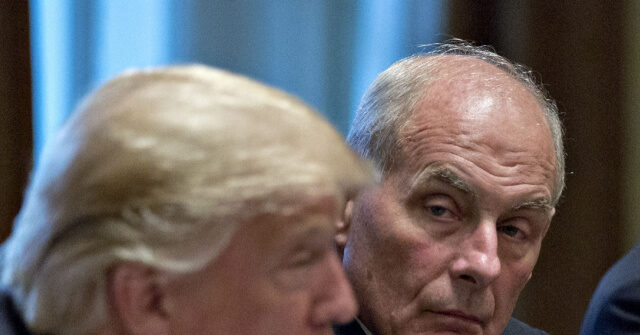Mark Paoletta, who served as general counsel for the Office of Management and Budget during the Trump administration, has come forward with serious allegations against former Chief of Staff John Kelly. Recently, Kelly expressed his views on Donald Trump’s leadership style, labeling him as a “fascist” in an interview. This characterization was seen as politically charged and aligned with the narratives promulgated by Trump’s opponents, including Vice President Kamala Harris, who seized on Kelly’s remarks to bolster her own criticisms of Trump.
In his response to these comments, Paoletta emphasized his lack of faith in Kelly’s credibility. He described Kelly’s tenure as Chief of Staff as marked by insubordination and dishonesty, claiming that Kelly actively obstructed President Trump’s initiatives rather than facilitating them. Paoletta recounted two incidents that he argues reflect Kelly’s disloyalty: the first involved efforts to secure funding for Trump’s border wall, and the second pertained to handling allegations of election fraud. In both cases, Paoletta asserts that Kelly deliberately withheld critical information and advice from Trump, undermining the President’s policy goals.
Regarding the border wall funding, Paoletta recalls how Trump had instructed Mick Mulvaney, then OMB Director, to identify available funds for the wall. He recounts a situation where efforts to present a feasible plan to Trump were thwarted by Kelly’s reluctance to arrange meetings, ultimately leading to an unexpected delay in funding discussions. Paoletta contends this exemplifies Kelly’s failure to fulfill his duty as Chief of Staff, citing this obstruction as part of an overarching pattern of behavior that disallowed Trump from exercising the authority granted to him by voters.
In another significant moment, Paoletta, during a meeting with Kelly and others, proposed that President Trump direct the Department of Justice to examine allegations of election fraud—a move he believed was supported by precedent among past presidents. However, he claims that Kelly dismissed this recommendation out of hand, refusing to present supporting historical examples to Trump. Paoletta asserts that this decision not only denied Trump a valuable course of action but also reflected Kelly’s broader reluctance to support Trump’s agenda, citing Kelly’s concerns that such knowledge would only complicate his relationship with Trump.
Furthermore, Paoletta painted a portrait of Kelly as a Chief of Staff who often resorted to threats of resignation to exert pressure and manipulate situations. He claimed these dramatic displays were indicative of Kelly’s inability to adapt to a subordinate role after a distinguished military career. According to Paoletta, the frequent threats to quit were not genuinely motivated by principled objections but rather a means of maintaining relevance and authority within the White House, which Paoletta viewed as unprofessional and detrimental to the functioning of the administration.
The conclusion drawn from Paoletta’s accounts is that John Kelly’s behavior reflects a broader pattern of resistance to President Trump’s directives, characterized by insubordination and a personal agenda that prioritized his own views over the President’s. Paoletta’s denunciation of Kelly serves as an appeal for accountability among those in positions of power within the administration, emphasizing that Kelly’s actions had consequences not just for Trump, but for the effectiveness of the entire government during that period. Ultimately, Paoletta’s revelations present a contentious view of Kelly’s legacy, framing it as one of obstruction rather than support for the Trump administration’s objectives.

